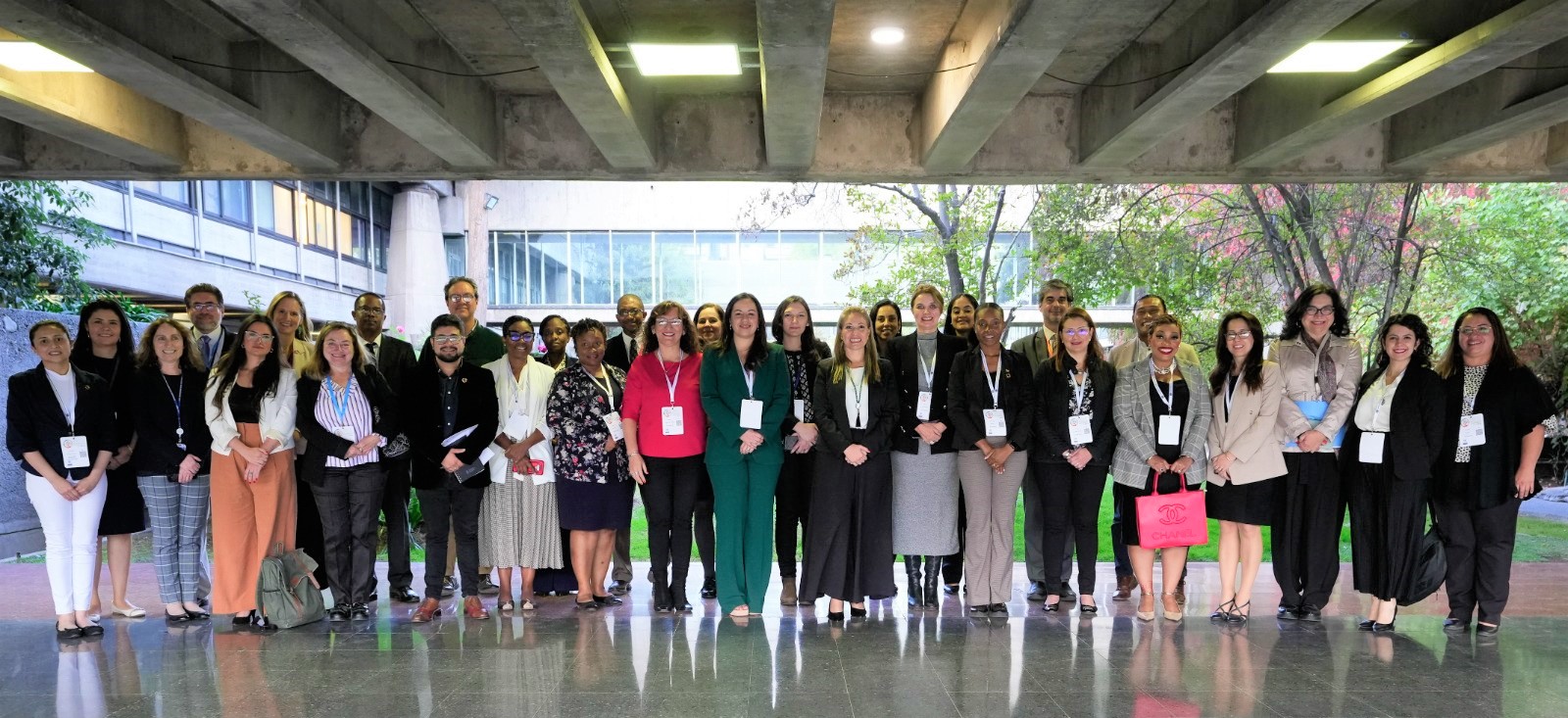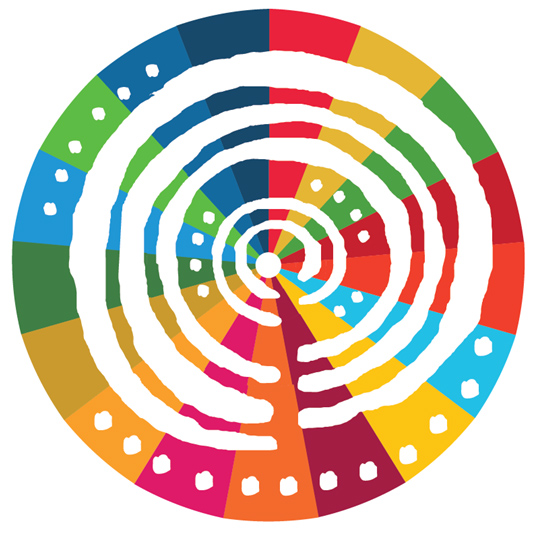Regional Voluntary National Review and Voluntary Local Review Workshop for Latin American and Caribbean countries
Teaser
The goal of this workshop was to strengthen the knowledge and capacities of Latin American and Caribbean countries in the formulation and preparation of their Voluntary National Reviews and Voluntary Local Reviews as part of their national strategy to implement and monitor the 2030 Agenda for Sustainable Development as well as to enhance vertical integration across the local, national, regional and global levels.
Event information

Date
25 Apr 2023, 07:40 - 14:40Event type
Within the framework of the Sixth Meeting of the Forum of the Countries of Latin America and the Caribbean on Sustainable Development held in person at the headquarters of the Economic Commission for Latin America and the Caribbean (ECLAC) in Santiago, from 25 to 28 April, 2023, under the Chairship of Argentina, ECLAC and the United Nations Department of Economic and Social Affairs (DESA) organized a regional workshop on Voluntary National Reviews (VNRs) and the relationship between VNRs and Voluntary Local Reviews (VLRs) for Latin American and Caribbean (LAC) countries.
BACKGROUND
The countries of the LAC region have appropriated the 2030 Agenda for Sustainable Development as a State commitment, in broad cooperation with multiple actors, including civil society, youth, the private sector, academia, local authorities and legislative authorities, among others. Between 2016 and 2022, 31 of the 33 countries in Latin America and the Caribbean reported their progress in the ownership, monitoring and implementation of the 2030 Agenda and the SDGs with the presentation of at least one VNR at the High-level Political Forum on Sustainable Development (HLPF) in New York. Of these 31 countries, 16 countries have presented a VNR on more than one occasion. Despite the various challenges posed by multiple crisis, including the COVID-19 pandemic, the crisis in Ukraine and climate change, the commitment and sustained effort of the countries to ensure the follow-up of the 2030 Agenda and the 17 Sustainable Development Goals (SDGs) remains uncompromised. While the 2030 Agenda continues to be the roadmap for a sustainable post-pandemic recovery, the VNRs continue to be the main mechanisms for reviewing the progress and challenges in the implementation of the 2030 Agenda at the national level and allow accounting for the trajectory and the strategies of each country. They also generate opportunities for peer learning and collective reflection on common or cross-border challenges of sustainable development. The emergence in the region of a series of VLRs, innovative exercises that express the commitment of actors at the sub-national, municipal and local levels with the 2030 Agenda, also constitute a tool for appropriation of the SDGs and complement national monitoring and review efforts.
PARTICIPANTS
This year, four Latin American and Caribbean countries will formally present their VNRs during the HLPF in July 2023: St. Kitts and Navis for the first time, Barbados and Guyana for the second time, and Chile for the third time. Participants at this regional workshop included representatives from the 2023 VNR countries as well as those countries that intend to present their VNR in 2024 and beyond; other countries from the Latin American and Caribbean region, including those actively involved in ECLAC’s Community of Practice on VNRs for LAC countries that may share relevant experiences from VNR processes of previous years; local authorities from the LAC region that have been involved in SDG localization efforts and/or the preparation of VLRs; Resident Coordinators of the United Nations system and representatives of their offices, and other officials of the United Nations system, including from DESA and ECLAC, as well as other actors, including civil society and the academic sector. About 75 participants from 20 countries (Antigua and Barbuda, Argentina, Barbados, Brazil, Chile, Colombia, Costa Rica, Dominican Republic, Ecuador, Germany, Guyana, Guatemala, Mexico, Paraguay, Peru, Dominican Republic, St. Kitts and Nevis, Suriname, Venezuela, United States) attended the workshop, both in person and virtually.
GOAL OF THE WORKSHOP
The main goal of the workshop was to strengthen the knowledge and capacities of LAC countries in the formulation and preparation of their VNRs and VLRs as part of national strategy to implement and monitor the 2030 Agenda, and to enhance vertical integration across the local, national, regional and global levels.
OUTCOMES
Expected outcomes of this workshop included:
-
Greater regional dialogue, peer learning and exchange of good practices in the formulation, dissemination and presentation of VNRs and VLRs in different contexts, as well as in the national responses to the COVID-19 pandemic and its interlinkages with the implementation of the SDGs.
-
Strengthening of the capacities of the participants to link the VNRs with the national long-term implementation strategies of the 2030 Agenda, link subnational and local efforts and identify their contribution to the VNR process.
METHODOLOGY
The workshop included interactive sessions on national efforts to prepare for VNRs and follow-up to the 2030 Agenda. Specific areas were discussed, such as the strategies and roadmaps for the fulfillment of the 2030 Agenda in all its dimensions in the medium and long term, the importance of the territorialization of the SDGs, monitoring and measuring progress, identifying challenges and solutions, and active participation of relevant actors, among others. Valuable lessons learned from past VNR and VLR processes were showcased, as well as the key messages that emerged from ECLAC’s Community of Practice. Additionally, VNRs and VLRs were reflected on as a tool to accelerate action for the SDGs within the framework of the Decade of Action and with a view towards the United Nations SDG Summit coming up in September 2023. The workshop was held in a spirit of peer learning by encouraging the exchange of concrete experiences from the participating countries and local authorities. Countries were invited to give presentations based on guiding questions, which were followed by interactive discussions to encourage dialogue and exchange among all participants.
VIDEO
[[{"fid":"113462","view_mode":"default","fields":{"format":"default","alignment":"center"},"type":"media","field_deltas":{"1":{"format":"default","alignment":"center"}},"attributes":{"class":"media-element file-default media-wysiwyg-align-center","data-delta":"1"}}]]
Programme of work
Welcome and Opening Remarks
Room
• Cielo Morales, Director, ILPES, ECLAC
• Neil Pierre, Acting Director of OISC, DESA
Moderator – Abdullahi Abdulkadri, Coordinator, Statistics and Social Development Unit, Subregional headquarters for the Caribbean, ECLAC
Session 1: VNRs and the implementation strategy of the 2030 Agenda
Room
Mid-point of the implementation of the 2030 Agenda: Progress and challenges on the road to 2030 in the LAC region
• Presentation by Mareike Eberz, Economic Affairs Officer, Office of the Executive Secretary, ECLAC
The VNRs at the 2023 United Nations High-level Political Forum on Sustainable Development (HLPF)
• Presentation by Maame Agyeben, Associate Sustainable Development Officer, OISC, DESA
Presentations by the 2023 VNR countries from the region
Room
• Shennel Richards, Chief Research Officer, Prime Minister's Office, Barbados
• Nicole Romo, Head of the Public-Private Cooperation Division, Head of the Technical Secretariat of the National Council for the Implementation of the 2030 Agenda and Iris Salinas, Head of the Inclusive Development Department, Public-Private Cooperation Division, Ministry of Social Development and Family, Chile
• Auren Manners, Director, Department of Public Sector Investment Planning, Ministry of Sustainable Development, St. Kitts and Nevis
Guiding questions
➢ Which lessons learned can you share regarding the VNR elaboration process?
➢ What are the main opportunities for acceleration of the SDGs that are reflected in your VNR?
➢ How have you enabled meaningful engagement of relevant stakeholders in the preparation of your VNR?
➢ How are you addressing statistical impediments for monitoring the 2030 Agenda?
➢ Are there any unresolved issues in the elaboration of your VNR? How have you solved the main challenges in preparing your VNR?
Interactive dialogue: Peer-exchange with previous VNR countries and other stakeholders
Room
Meaningful stakeholder engagement in the implementation of the 2030 Agenda in Antigua and Barbuda
• Joy-Marie King, Ministry of Foreign Affairs Director of International Trade, Antigua and Barbuda
Data and statistics in the implementation of the 2030 Agenda in Costa Rica
• Carla Morales, Development Manager, MIDEPLAN, Costa Rica
The VNR Quality Index – a new tool to measure how countries are reporting the national implementation of the 2030 Agenda
• Javier Surasky, Program Officer Governance and Financing for Sustainable Development, Cepei
Coffee break
Room
Session 2: Ensuring a Dialogue between the VNRs and VLRs – Experiences from 2021 and 2022 VNR Countries
Room
Moderator – Humberto Soto, Social Affairs Officer, Social Affairs Officer, Subregional Headquarters in Mexico, ECLAC
High-level Intervention - Carmen Ubaldi, Minister Executive Secretary of the Technical Secretariat for Planning of the Republic of Paraguay
VNR/VLR Integration: developments at international level
• Presentation Carol Pollack, Inter-Regional Advisor, DSDG, DESA
National and sub-national experiences from the region
Presentations by government and local authorities:
• Argentina – Experience from a 2022 VNR country
o María Eugenia Brisson, Technical coordinator of the National SDG Team of the National Council for the Coordination of Social Policies, Argentina
o Constanza Renzone, Secretary of International Affairs, Tierra del Fuego province, Antarctica and South Atlantic Islands, Argentina
• Mexico – Experience from a 2021 VNR country
o Jessica Gabriela Ibarra Castro, Deputy Director of International Relations, General Coordination of Advisors and International Affairs of the Government of Mexico City
• Paraguay – Integrating VNRs and VLRs for a 2024 VNR
o Ambassador Helena Felip, Coordinator, SDG Commission, Ministry of Foreign Affairs, Republic of Paraguay
o Yenny Franco, Strategic Planning, Municipality of Philadelphia
Perspectives from Civil Society
• Mr. Jorge Abrahão, Director of the Sustainable Cities Institute (ICS) in Brazil (presentation of the Index of Sustainable Development of Cities – Brazil)
Guiding Questions
➢ How have VNR and VLR processes contributed to dialogue and planning between national and subnational levels in terms of SDG implementation?
➢ What are the recommendations to strengthen the engagement of local and regional governments in the VNR process?
➢ How do VNRs and VLRs inform and strengthen each other?
➢ How have local and regional governments and stakeholders been engaged in the VNR process in your country? What are the main outcomes of this engagement?
➢ What are the main challenges, lessons learned and recommendations in conducting VLRs and/or utilizing VLRs in a Voluntary National Review?
➢ How can local stakeholders, in particular local and regional governments, support the provision of timely and disaggregated data for national SDG follow-up and VNR reports?
Interactive dialogue
Room
Final Reflections and Closing Remarks – DESA/ECLAC
Room
Attachment(s)
-
Concept Note and Programme
ECLAC - Mareike Eberz
DESA - Maame Agyeben
Barbados - Shennel Richards
Chile - Nicole Romo and Iris Salinas
Saint Kitts and Nevis - Auren Manners
Costa Rica - Carla Morales
Cepei - Javier Surasky
Paraguay - Carmen Ubaldi
DESA - Carol Pollack
Argentina - María Eugenia Brisson
Argentina - Constanza Renzone
Paraguay - Helena Felip
Paraguay- Yenny Franco
Brazil - Jorge Abrahão
Related link(s)
Organizing institution
Economic Commission for Latin America and the Caribbean (ECLAC)
- https://www.cepal.org
- 56 222100000
